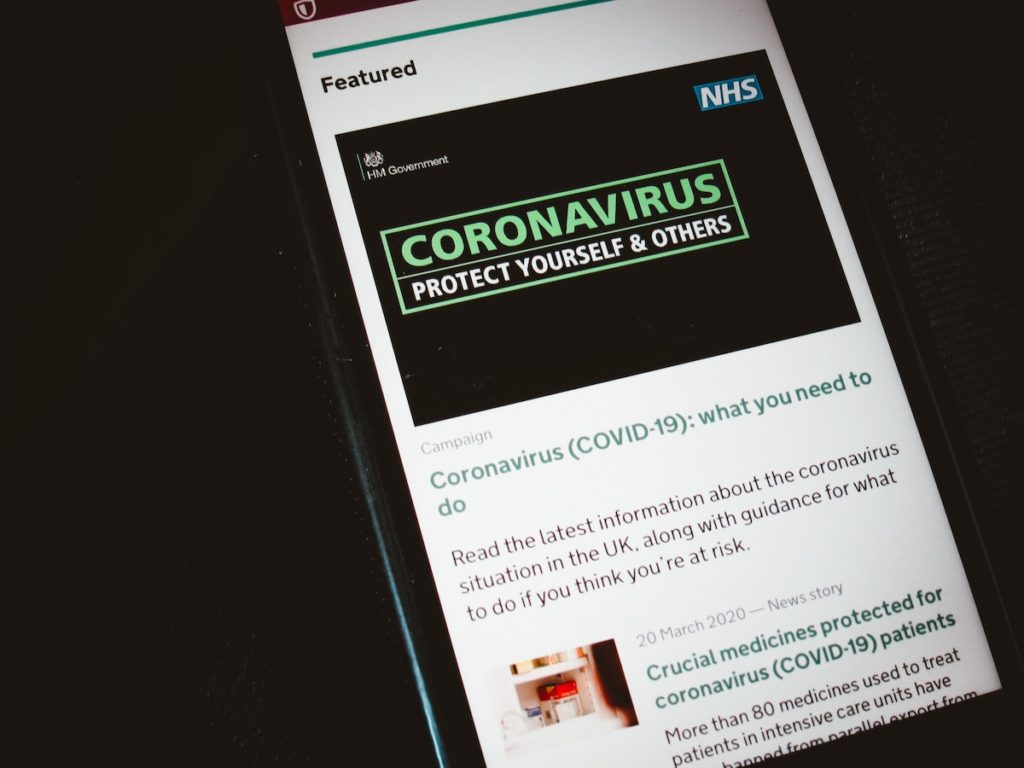
In late 2019 a new strain of coronavirus emerged in China that went on to become an international pandemic. By 25th March 2020, more than 400,000 people had been confirmed as infected, although this is widely assumed to be an underestimate of the true case number. The virus’ impact is particularly significant in those over 70 and people with underlying health conditions.
Whilst the physical symptoms and complications were the main focus of the WHO and national governments, the psychological and social consequences drew increasing amounts of attention as individuals were advised to ‘socially distance’ themselves from others.
In March 2020 many governments across the world began to ask people to self-isolate to limit the spread of the virus and minimise the burden on healthcare services. Millions of children were sent home from school, and most workers were asked to work from home. In the UK, individuals considered at-risk (those aged over 70, those with underlying health conditions and those who were pregnant) were asked to isolate themselves from direct contact for a minimum of 12 weeks, and those exposed to a suspected case of coronavirus were asked to stay in their homes and isolate themselves and anyone living with them for 14 days. Increasing concerns were expressed about the psychological impacts of these changes, and new advice on how to maintain mental health and wellbeing became more prevalent despite the lack of scientific scrutiny of such advice.
In response to these challenges, Brooks et al undertook a rapid review of evidence related to the consequences of quarantine for mental health and wellbeing (Brooks et al., 2020). The Centre for Disease Control and Prevention definition of quarantine was used in the article: “the separation and restriction of movement of people who have potentially been exposed to a contagious disease to ascertain if they become unwell” (CDC, 2017). T
The paper aimed to provide information to guide public health policy during the coronavirus outbreak. Policy at the time of writing this blog included the practice of strict self-isolation, where people were asked not to leave their home for any reason, other than essential shopping or to exercise, and not go out or have visitors in the home.

As unprecedented times call for unprecedented public health measures, what are the psychological effects of such measures?
Methods
The authors were interested in individuals subjected to quarantine and whether there was a psychological impact on their mental health and/or wellbeing. They considered primary research, involving participants that had been quarantined for at least 24 hours in a community setting, published in English or Italian, and prevalence or factors associated with mental health and/or wellbeing. They searched MEDLINE, PsychINFO, and Web of Science, using search terms related to quarantine and mental health. The authors did not report the number of reviewers, whether titles or abstracts were reviewed by two or more authors, how data was extracted or how disagreements were resolved.
The authors also examined whether there were factors that mitigated or exacerbated the psychological effects of quarantine. No meta-analysis of outcomes was undertaken. Quality assessment was not conducted for the included studies, all of which were observational and did not randomise individuals to quarantine or not.
Results
3,166 studies were identified of which 24 met the inclusion criteria for the review. The studies were conducted across 10 countries. Eleven studies considered the psychological effects of quarantine after SARS, 5 following outbreaks of Ebola, 3 after the 2009/2010 H1N1 influenza pandemic, 2 after MERS, and 1 after equine influenza. Twenty-four citations are summarised briefly in the review. Participants included those from the general population, hospital staff, school/student communities, disease-contacts and horse owners. As well as the populations sampled, the studies differed in the duration of quarantine with some reporting unclear lengths, the mental health and wellbeing measures used and the length of follow up.
The majority of studies examined mental health and wellbeing soon after quarantine. Most studies reported higher levels of psychological distress in individuals exposed to quarantine; including symptoms of anxiety, irritability, insomnia and depression. Higher levels of post-traumatic stress disorder symptoms were also noted and in one study these were regarded as sufficient to make a diagnosis of a traumatic mental health diagnosis in 28% of participants. One study comparing quarantined undergraduate students to a non-quarantined group found no significant difference in the rates of post-traumatic stress symptoms or general mental health problems, although the authors suggest that these individuals were young and likely had fewer responsibilities.
Few studies examined the longer-term psychological consequences of quarantine. One study of 1,656 residents quarantined due to MERS contact noted that the frequency of self-reported anxiety and anger had reduced 5 months after quarantine had ended. Only two studies examined the psychological effects after 12 months, and found higher rates of psychological symptoms in quarantined individuals versus non-quarantined individuals as long as 3 years later. Several of the reviewed qualitative studies indicated long-term behavioural changes, such as avoiding crowds.
Pre-quarantine predictors of psychological impact included lower levels of education and a history of psychiatric disorder. Other factors potentially play a part, but these were less consistently demonstrated across studies. A longer duration of quarantine, fears of infection, frustration/boredom, inadequate supplies and information during the period of quarantine were each associated with greater psychological impacts afterwards. The authors highlighted the lasting impact of financial loss as a result of quarantine and its association with poor mental health and wellbeing. Additionally, the stigmatisation of previously quarantined individuals was identified as a major theme across the reviewed studies.

Quarantine appeared to lead to higher levels of psychological distress in the short-term, with some limited evidence for longer-term effects.
Conclusions
The authors conclude that quarantine can negatively impact the mental health and wellbeing of individuals, but note the consequences of not doing so is potentially far worse.
The authors suggest that the following strategies may reduce the psychological impacts of quarantine:
- Keeping the quarantine as short as possible
- Providing people with as much information as possible
- Providing adequate supplies
- Reducing boredom and improving communication
- Paying health-care workers special attention
- Promoting altruism over compulsion in maintaining quarantine.
Many of these recommendations were based on the results of relatively few included studies, with little attention to confounders, which may have allowed for more nuanced recommendations.

The authors suggest some recommendations to reduce the mental impact of quarantine as the consequences of not quarantining could be devastating.
Strengths and limitations
This review is timely and important considering the current international situation, which has required gradually more stringent measures to tackle. It is recognised that due to the rapid nature of this review, inevitably the quality of the methodology was limited and therefore the results should be interpreted with caution.
Some limitations of the review include:
- The included studies were diverse in their location and the majority included individuals quarantined for SARS;
- Reviewed studies had very different designs, populations and assessment tools: could cultural and political factors have played a role in determining the outcomes?
- The review only included observational studies, which are liable to multiple sources of bias;
- No quality assessment of studies was conducted;
- No detail was provided regarding the number of reviewers or whether studies were considered by more than one reviewer;
- There was no quantitative assessment of quarantine length on mental health and wellbeing despite the suggestion that shorter quarantines are better for mental health;
- Confounders such as age, gender, socioeconomic status, and pre-existing mental health conditions to name a few, were not adequately discussed and may have provided a more sophisticated understanding of the moderators of the relationship between quarantine and mental health.

This is a timely and important review whilst the world is in the midst of a pandemic, but the results should be interpreted with caution because of methodological shortcomings.
Implications for practice
The recommendations from the authors are unlikely to negatively impact public health or healthcare practice even if based on insufficient evidence. It should be noted that the advice to restrict the length of quarantine “given the known duration of incubation periods” is somewhat impractical. In many cases, such as with COVID-19, decisions on quarantine length must be made while the evidence regarding the incubation and infectious periods is still at an early stage. Setting too-short of a quarantine period risks transmission. It is also worth noting that a similar rapid review concluded that early use of quarantine is one of the most effective methods of controlling the spread of coronavirus diseases like COVID-19 (Nussbaumer-Streit et al., 2020).
Although beyond the evidence provided by this review, we should note that we now have access to more health information through our computers, mobile phones and other devices, than at any time in the past. Psychological complications due to lack of information may be mitigated by the availability of these technologies, provided government, health services and broadcast media websites and social media accounts are kept up-to-date. One caution is that although information is now easier to access the quality of the information is not consistent across sources, and care must be taken to direct the public to verified and trustworthy outlets. More speculatively, these platforms may also mitigate any ill-effects of quarantine and isolation by providing a means for continuing interaction through email, audio and videoconferencing software. Similarly, technology may help to promote a sense of community and combat the stigma associated with being quarantined; several countries have seen individuals singing songs between balconies as a show of unity and of gratitude for those on the front lines of the COVID-19 outbreak.
We think governments can also provide top-down interventions to minimise the adverse psychological consequences of quarantine, and financial measures clearly emerged from this review as an important consideration. Reducing the need for people to consider whether they can afford to not go into work, or pay staff salaries, is likely to reduce psychological distress. We note, for example, that the US has (as of March 2020) an accelerating rate of COVID-19 infections, but has no national policy for statutory sick pay entitlements. Providing these basic financial supports for all citizens should be a priority for all governments.

Top-down interventions from governments need to be considered in ensuring financial security for individuals and organisations to reduce adverse psychological consequences.
Statement of interests
Matthew Iveson and Andrew McIntosh are supported by UKRI Mental Health Pathfinder Grant reference MC_PC_17209. Andrew McIntosh is additionally supported by Wellcome Trust Grant reference 104036/Z/14/Z.
Links
Primary paper
Brooks, S.K., Webster, R.K., Smith, L.E., Woodland, L., Wessely, S., Greenberg, N., & Rubin, G.J. (2020). The Psychological Impact of Quarantine and How To Reduce It: Rapid Review of the Evidence. The Lancet, 395:10227, 912-920. https://doi.org/10.1016/S0140-6736(20)30460-8
Other references
Centers for Disease Control and Prevention (2017). Quarantine and Isolation. https:www.cdc.gov/quarantine/index.html [Accessed: 24/03/2020]
Nussbaumer-Streit, B., Chapman, A., Dobrescu, A.L., Mayr, V., Persad, E., Klerings, I., & Gartlehner, G. (2020). The Effectiveness of Quarantine to Control the Coronavirus Disease 2019: A Rapid Review. The Lancet. https://papers.ssrn.com/sol3/papers.cfm?abstract_id=3550010
Photo credits
- Photo by Hello I’m Nik 🎞 on Unsplash
- Photo by Nik Shuliahin on Unsplash
- Photo by sorayut
- Photo by Lotus_studio
- Photo by AndriiKoval

[…] review has been blogged about by Dr Andrew McIntosh for the Mental Elf and to complement that, we wanted to set out our own […]